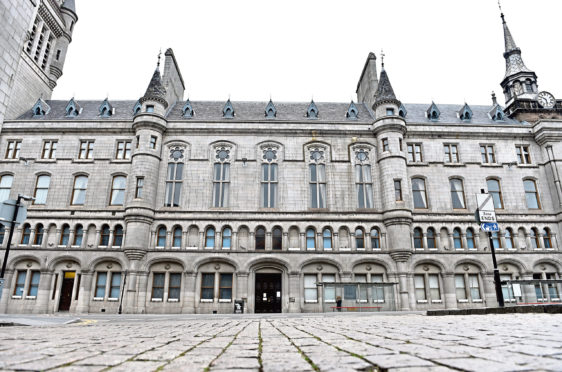Industrial action by solicitors could be on the table as concerns grow. over the backlog of court cases caused by the Covid-19 crisis
The Evening Express previously revealed that calls had been made for the P&J Live and Music Hall to be turned into temporary courtrooms to help tackle the number of cases delayed due to coronavirus.
Courts across the country all but ground to a halt in March when the Covid-19 pandemic first took hold in the UK and sheriff and jury trials have still not resumed.
And now lawyers have voiced their displeasure at proposed methods of tackling the backlog which may mean longer hours.
Stuart Murray, president of the Aberdeen Bar Association, said: “Senior management within the organisation have continually failed to include criminal defence solicitors in consultation regarding how best to deal with the backlog of trials at both a summary and solemn level.
“While a few summary level trials are taking place, the courts have failed to come up with a practical solution to get business flowing through the courts at a level that would substantially decrease the backlog.
“Instead, solicitors, procurator fiscal deputes and court staff, are now faced with the very real prospect of having to work late hours and at weekends, with the Lord President considering the introduction of evening and Saturday courts.
“Bar Associations across the country are now being called by their members to consider industrial action. This is not a route that anyone wants to take as solicitors take very seriously the difficulties caused by the Covid-19 pandemic.
“There is no easy solution but more effort must be made by the Scottish Courts and Tribunals Service to ensure that courts get back up and running with a degree of normality.
“That is vital for benefit of all those involved in the process and especially for those who have had offences committed against them and those who have been accused of offending.”
The number of trials waiting to be heard in Scotland has risen by 22% due to the coronavirus pandemic, official statistics show.
As a result of the pandemic, court business across the country was curtailed, prompting Eric McQueen, the head of the Scottish Courts and Tribunals Service (SCTS), to tell MSPs the backlog of sheriff court cases could take up to a decade to clear.
The SCTS recently announced plans to start High Court trials in Edinburgh and Glasgow with juries watching proceedings from a cinema.
Aberdeen defence agent Alex Burn, of Burn and McGregor, also spoke of his concerns and said: “Court officers, they’ve got their lives as well. They signed up for a nine-to-five job. You can’t be telling them ‘you must work in the evening’, you’d have to change their terms of employment. No doubt there will be some accommodation, they may get an extra payment for giving up their time. I’m sure the fiscals will get an enhanced payment.
“But the legal aid board, currently there is no facility for them to give us enhanced payment for working unsociable hours. That’s an issue in the future that’s going to have to be addressed because as it stands just now we work 24/7.
“We get calls throughout the night, we’re working during the day. And of course, like every other citizen, we’ve got a right to a private life too, but that’s never really taken into consideration.
“There are difficulties because you’re an officer of the court and you owe huge responsibilities to the court. That being said, nobody wants to take industrial action but ultimately it may have to come to that because there’s so little regard given to the defence in these discussions.
“We’re seldom properly involved in these discussions and I don’t think they really care too much what our views are when it comes to the final analysis of how they’re going to deal with the problem.
“It does concern me the way things are going so slow.”
A spokesman for the Scottish Courts and Tribunal Service said: “It is premature to talk of the prospect of Saturday courts which is only one of the potential options that have been modelled by SCTS to recover from the coronavirus impact on summary trials.
“As highlighted in the recent SCTS report, this option would require consultation and engagement with the legal profession, justice organisations and the third sector, as the resource impact would need to be assessed across the whole justice system.
“The modelling report was designed to aid transparency and stimulate discussion on different options to ensure that the right solutions can be tested and explored. Summary trials have resumed in our 33 courtrooms and some virtual hearings are under way. Because of physical distancing, the number of trials proceeding inevitably is less and as the weeks go by the backlog increases.
“We need to find a solution to prevent extensive trial delays impacting on the accused, victims and witnesses. We are also looking at the impact of increasing the number of courtrooms available during the normal working week for hearings and that too has resource implications for all organisations.”
